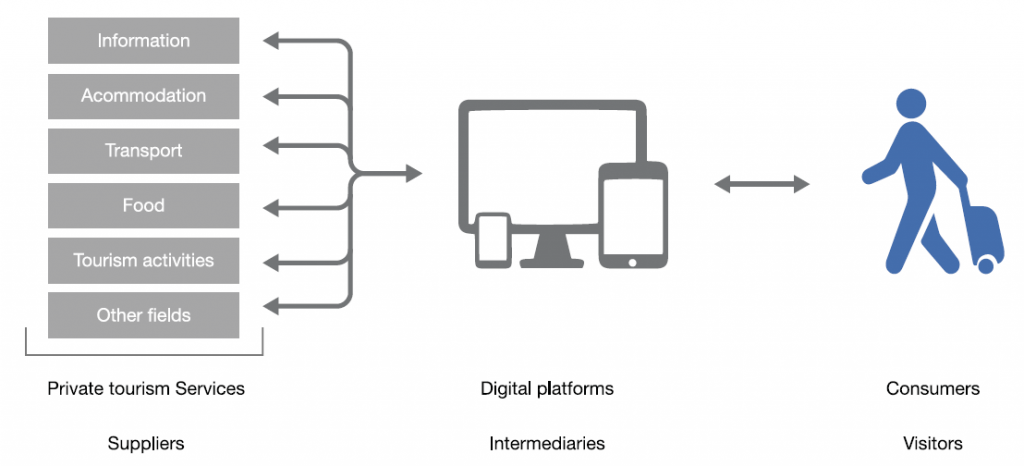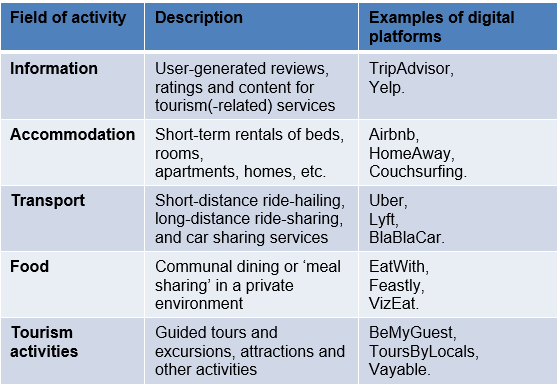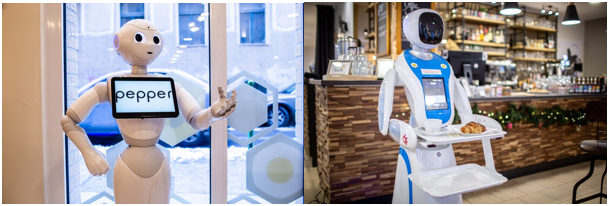Digitalization in Hungary’s tourism – the case of Budapest
Changing travel patterns require various tourism industry sub-sectors to adapt to the wide-ranging needs of customers. With the increase in leisure time, most people travel several times a year. Next to that, new destinations are being introduced; cheap flights are offered by multiple airlines, while the consumer decision-making process becomes even shorter. A Next Tourism Generation Alliance key partner, the University of Sopron, looks into ‘new platform services’ (UNWTO, 2017) and how digitalisation is bringing radical changes to tourism and hospitality. The blog explores a cutting edge robot café and an innovative smartphone-controlled hotel in Budapest, Hungary.
New platform services
Digitalization in tourism covers location-based services, artificial intelligence, widened and virtual reality, smartphones and smart glasses. UNWTO (United Nations World Tourism Organization) drew attention to smart travel and smart destinations. Advances in technology have also led to the rise of digital platforms, referred to as new platform services.
According to UNWTO (2017), new platform tourism services require business models in which private individuals offer goods and services to visitors through digital platforms. Information, accommodation, transport, gastronomy and other tourism services are supplied via these digital intermediaries to consumers (Figure 1).

Figure 1: The role of digital platforms (UNWTO, 2017, p.16)
Table 1 describes the fields of activity of new platform tourism services and provides examples of intermediaries (UNWTO, 2017).

Table 1: Fields of activity of new platform tourism services (UNWTO, 2017, p.15)
Digitalisation in tourism and hospitality in Budapest
In this case, the focus is on two Hungarian examples, a robot-based café and a smartphone-controlled hotel in Budapest, with emphasis on new platforms.
Case 1: Enjoy Budapest Café
When a guest enters the door, they are greeted by a robot in English. Their order will be delivered by a larger robot with red glowing eyes. This is not science fiction, it is a reality in Budapest.
The café’s receptionist is a kid-sized robot called Pepper who is the main attraction. She can read emotions from faces, greets guests at the door, asks for their name and age, constantly strives for eye contact and visitors chat with her. The service in the café is provided by two adult-sized robots.

Figure 2: Robots at Work (source: welovebudapest.com)
Behind the idea is the IT Company E-Software Development Ltd. that develop integrated systems, including artificial intelligence for local companies. The café is a kind of showroom, with nine smaller toy-sized robots and seven big ones. Guests can discover the possibilities of robots and play with them. The company is trying to bring robotics and programming closer to guests, especially the next generation of kids.

Figure 3: Robots to be tried (source: welovebudapest.com)
Case 2: Smartphone-controlled hotel
After two years of IT development and construction, Europe’s first four-star smartphone-controlled smart KViHotel was opened in Budapest. This is the first demo-hotel of TMRW Hotels fully controlled by the smartphones of guests. The modern 40-room-hotel is almost entirely staff-free, working with the TMRW Hotels application. This application controls all functions from check-in to check-out using the guest’s own smartphone. Hotel guests can access all the services of the hotel by touching a button in the application. Guests can book a room and check-in without waiting, up to 48 hours prior to arrival. Visitors can select their desired floor and choose their room from three room categories (superior, deluxe, and junior suite). Their smartphone serves as the room key via Bluetooth, and in the case of a late-night arrival, the smartphone opens the hotel’s main entrance. The TMRW application controls the cooling and heating of the room and allows the guest to set the desired room temperature from up to 10,000 kilometres away.

Figure 4: Room in the hotel (source: turizmus.com)
Guests can serve themselves with flavoured mineral water and snacks from the mini-bar free of charge and the use of a coffee machine in the junior suite is also free. Each guestroom is equipped with a smart TV that allows visitors to listen to their favourite music or watch videos, films, and series.
Guests can request extra cleaning from the application or display a “don’t disturb” board virtually. Check-out by smartphone means no need to queue and after paying by credit card (if available on PayPal); the system sends the bill to the email address of the guest.
A hotel like this can practically work with a few employees for housekeeping and bar service, especially as the breakfast buffet is outsourced. Guest questions are answered by virtual porters 24 hours a day and help is available on all platforms (Facebook Messenger, WhatsApp, Skype, iMessage etc.), but if needed a (human) consultant can be called by phone.
Conclusion
The above-mentioned examples are highly interesting to some segments, but their full spread is indispensable as personal contact is essential in all sectors of tourism. Due to labour shortages, tourism is forcing digitization of certain areas, but overall, with the development of digital skills, personal presence cannot be replaced by robots.
Sources
turizmus.com (2018): Okoshotel nyílt a Nyár utcában
https://turizmus.com/szallashely-vendeglatas/okoshotel-nyilt-a-nyar-utcaban-1156455
UNWTO (2017): New Platform Tourism Services (or the so-called Sharing Economy) Understand, Rethink and Adapt. Madrid
https://www.e-unwto.org/doi/abs/10.18111/9789284419081
welovebudapest.com (2019): Ittunk egy forró csokit az Enjoy Budapest Cafeban
Authors:
Csilla Jandala – Associate Professor (University of Sopron) – dedicated to innovate tourism education in Hungary and her research focuses on the Hungarian labour situation in the tourism sector.
Nikoletta Németh – Assistant Professor (University of Sopron) – her purpose is to keep and increase the role of local values and so, her research carried out recently is about local markets and slow tourism.
Follow the efforts of the Next Tourism Generation via our website, Facebook, Twitter | #NTGskillsalliance or via LinkedIn




No Comments